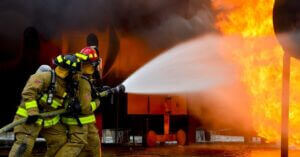HVAC System Restoration Services – Should I Keep The System Running After Fire and Smoke Damage?
 Wondering if it’s safe to keep your HVAC system running after a fire? The short answer would be not before cleaning the air filters. It doesn’t matter if your system was operating during the fire or not. It most likely sustained fire and smoke damage during the incident. Asking professionals for HVAC restoration services can mitigate risks.
Wondering if it’s safe to keep your HVAC system running after a fire? The short answer would be not before cleaning the air filters. It doesn’t matter if your system was operating during the fire or not. It most likely sustained fire and smoke damage during the incident. Asking professionals for HVAC restoration services can mitigate risks.
Therefore, it’s better to get your system inspected before use.
Let’s look at why it’s important.
The Impact: Why Do You Need HVAC Restoration Services?
Wildfires and house fires have a similar effect on your HVAC system. All components present inside and outside the system are put at risk when such an incident happens. Remember that smoke particles can be invasive, and they spread fast because they are airborne.
Buildings and residential properties miles away from the source of the fire can be affected by its pervasive characteristic. That’s why it’s better to be safe and wait for the 911 Restoration of Long Beach to arrive before you start your HVAC system.
Here’s a closer look at the consequences of smoke and fire:
1. Clogged Filters and Air Ducts
Tiny soot and ash particles sneak into the HVAC system, accumulating inside the filters. Their presence can clog ductwork and prevent your system from cleaning the air. Excessive buildup pollutes indoor air quality and inhibits your appliance’s performance.
Subsequently, your HVAC system might work in overdrive, causing utility bills to spike to the higher power consumption. Their size makes these pollutants impossible to catch once they re-enter the air around you.
Nevertheless, you might notice that the indoor environment becomes stuffy and smoky if you run the unit without servicing it. Use this as a warning to switch your HVAC system off before further fire and smoke damage.
2. Poor Air Quality
Unclean filters reduce air quality by spreading airborne pollutants everywhere. It can instigate a negative response amongst sensitive individuals, children, and the elderly.
Most frequent complaints include breathing difficulties, coughing, suffocation, and headache. The health problems will persist until you clean your HVAC system.
3. Moldy Air Ducts
Is it safe to keep the HVAC system running after fire damage if weeks have passed?
No, it isn’t safe.
It’s as dangerous as switching your system right after the fire. That’s because excessive exposure to water during firefighting activities can cause moisture buildup inside your HVAC system. Sometimes commercial buildings and residential properties might stay closed for weeks after a fire.
It provides sufficient time for mold to develop and spread throughout the HVAC system. Running the system without a professional inspection from an IICRC-certified home restoration expert can cause the mold spores to spread. Subsequently, their presence harms health too.
Common symptoms of mold present in indoor environments include:
- Wheezing
- Stuffy nose
- Coughing
- Migraines
- Irritated eyes
- Rash
Most of these side effects arise due to allergic reactions. Others form due to prolonged exposure to mold.
Getting your HVAC system inspected after a fire can prevent this risk.
Double the Trouble for Commercial Property Owners
If you own a commercial building, you can save yourself from a lawsuit against personal injury claims. The general public will consider the presence of mold, sooty air particles, and corroded pipelines harmful.
These may cause various types of health issues that develop due to the negligence of the property owner.
Corroded Condenser
Our home restoration experts think it’s not safe to keep the HVAC system running after the fire and smoke damage because of accelerated wear and tear. Everything from accumulating smoke, soot, ash, and continuous water damage can harm the condenser. Other metal components might begin to rust or deteriorate because of prolonged exposure to pollutants.
As a consequence, your HVAC system might need repairs before it’s used after the fire.
911 Restoration of Long Beach to the Rescue
Our reputable restoration company offers various smoke and fire damage restoration services. Years of training and professional certification help our team to identify potential threats. We will conduct a detailed inspection of your system before restoring damaged parts.
Here’s a breakdown of our HVAC restoration services:
- We prioritize soot and ash removal to eliminate pollutants from the HVAC system.
- Our trained technicians run a water extraction service to remove any moisture residue.
- We clean the air filters and sanitize the space to remove mold/germs present inside
- HVAC system goes through advanced deodorization treatment to reduce moldy and stuffy smell
- All corroded and damaged parts get repaired, restored, or replaced after the fire.
Moreover, we offer insurance support to clients interested in receiving reimbursement.
Parting Words
Fire and smoke damage make HVAC systems unsafe to use after an event. It clogs filters, increases corrosion, promotes mold growth, and reduces air quality. A professional inspection of your HVAC system can minimize risks.
Our technicians can determine the extent of the damage and resolve those issues. Consequently, ensuring that your system returns to its peak operating performance after restoration.
Contact 911 Restoration of Long Beach for more information.



